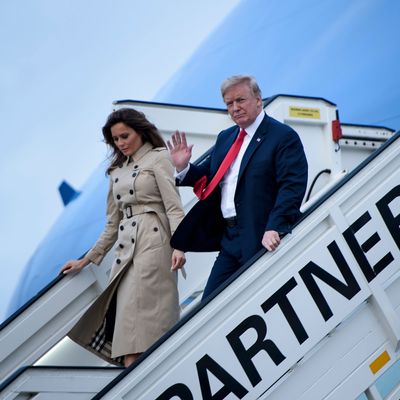
President Trump tweeted today that America’s NATO allies have been “delinquent for many years in payments” and should “reimburse the U.S.” That is not how NATO works. It is not a protection scheme where the allies pay the United States. It is a collective defense organization in which members agree that an attack on one is an attack on all. NATO members have agreed to increase their defense spending levels, but the target date is 2024 — which is to say, they are not “delinquent” on anything.
One cannot rule out the possibility that Trump lacks the mental capacity to understand the basic form of America’s most important alliance. But it is at least as likely that Trump is choosing not to understand this, so that he can precipitate a fissure within the alliance.
Last week, Trump’s national security advisers, who have traditional Republican views toward NATO (good) and Russia (bad), and the allies both expressed their hope that Trump would use the NATO summit to declare victory. Trump has been calling for the allies to increase their defense spending, and indeed they have. The increase has been ongoing since 2014, when Russia invaded Crimea, but the allies signaled they would be happy to let Trump claim credit. “The European officials we’ve spoken to would love nothing more than for Trump to take a victory lap and claim credit for them boosting their defense spending,” reported Jonathan Swan last week.
Oddly for Trump, he is not taking the opportunity to claim a win. Instead he appears to be defining the terms of the disagreement such that it cannot be resolved. NATO’s allies can always try to spend even more on defense, but asking them to pay the United States back dues that they never promised and do not owe is an impossible demand.
Where Trump’s intent has grown abundantly clear is the manner in which he is speaking to his supporters. At his rally in North Dakota two weeks ago, he said, “Sometimes our worst enemies are our so-called friends or allies, right?” At a subsequent rally in Montana last week, the president declared, “Our allies in many cases were worse than our enemies.” Trump understands the power of repetition, and it is notable to see this allies, they’re the worst, amirite formulation becoming a staple of his rhetoric.
More noticable still was a comment he made at the latter rally. Adopting his mocking pundit voice, he ridiculed the notion that “Putin is KGB.” (Putin did in fact work in the KGB.) “You know what,” he said, “Putin’s fine. He’s fine. We are all fine, we’re all people.”
Needless to say, “we’re all fine, we’re all people” is not Trump’s customary approach to the question of locating the shared humanity of all God’s creatures. But his efforts to train the Republican base to reverse its long-standing views on the relative merits of NATO and Russia have borne fruit. According to a recent poll, just 40 percent of Republicans think the U.S. should should stay in NATO, while 56 percent of Republicans consider Trump’s relationship with Vladimir Putin good for the United States.
Meanwhile, the Trump-Putin relationship is blossoming (or perhaps just coming out into the open). Putin reportedly has been telling Trump that “fake news” and the “deep state” are conspiring against them. (“It’s not us,” Putin has told Trump, according to an American source, summarizing his message, “it’s the subordinates fighting against our friendship.”) Trump has also reportedly expressed to Putin his desire for better relations, and called the advisers who tried to prevent him from congratulating the strongman on his reelection “stupid people.”
Compared to a week ago, it is now harder to imagine Trump will use the summit to leverage concessions that will make him appear like a strong negotiator, and much easier to imagine that he will use it to instigate a diplomatic crisis with NATO. By the time this is over, he may well have reoriented American foreign policy completely. It may seem bizarre that one man could do this, especially given that almost nobody in Trump’s administration or the ranks of the party’s political professionals share his goal of jettisoning NATO or closely courting Russia. Yet Trump has shown the ability to lead his base wherever he wants to take it. And where the base has gone, the party has eventually followed.






























